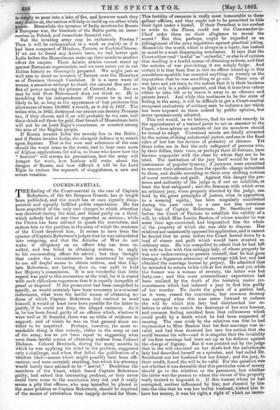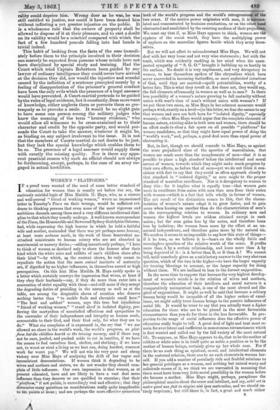COURTS-MARTIAL. T HE finding of the Court-martial in the case of
Captain Robertson, of the 4th Dragoon Guards, has at length been published, and the result has at once signally disap- pointed and signally fulfilled public expectation. He has been acquitted of the only two charges to which attention -was directed during the trial, and found guilty on a third, which nobody bad at any time regarded as serious ; while the Crown has been advised to quash the conviction, and restore him to the position in the army of which the sentence of the Court deprived him. It seems to have been the opinion of Captain Robertson's judges that be was intimidated into resigning, and that the Articles of War do not make it obligatory on an officer who has been in- sulted, and has failed in obtaining redress, to apply to his commanding officer for advice ; but they thought that under the circumstances last mentioned he ought to use all lawful means to obtain redress, and that Cap- tain Robertson, not having done so, was unfit to hold her Majesty's commission. It is not wonderful that little regard was paid to this accusation at the trial, for it is stated with such ridiculous vagueness that it is equally incapable of proof or disproof. If the prosecutor had been compelled to specify, as would certainly have been necessary in a criminal indictment, what were the lawful means of obtaining re- dress of which Captain Robertson had omitted to avail himself, it would at least have been possible for the latter to justify, if be could not deny, the alleged omission. As it is, he has been found guilty of an offence which, whether it were well or ill founded, there was no tittle of evidence to support, and of which he was on that ground alone en- titled to be acquitted. Perhaps, however, the most re- markable thing is that nobody, either in the army or out of the army, has as yet been equal to suggesting what were these lawful means of obtaining redress from Colonel Dickson. Colonel Bentinck, during the many months in which he was applying his mind to the problem, suggested only a challenge, and when that failed the publication of a virulent libel—means which might possibly have been effi- cacious, and were certainly startling, but which his attorney would hardly have advised to be "lawful." Doubtless the members of the Court, which found Captain Robertson guilty, had solved this interesting problem, or they never could have come to the conclusion they did, and it really seems a pity that officers, who may hereafter be placed in the same position as Captain Robertson, should be deprived of the means of extrication thus happily devised for them. This fertility of resource is really most honourable to these gallant officers, and they ought not to be permitted to hide their light under a bushel. If their President is too modest to write to the Times, could not the Commander-in- Chief order them on their allegiance to reveal the secret ? But this, perhaps, might be regarded as an infringement of the army regulation against practical joking. Meanwhile the world, which is always in a hurry, has rushed as usual to a most disparaging conclusion. It says that the Court either read" lawful" as" unlawful," or else is of opinion that duelling is a lawful means of obtaining redress, and that the articles of war prohibiting it are simply fudge. And certain it is that from first to last no officer mixed up in this scandalous squabble has resented anything so warmly as the imputation that he was unwilling to go out. These men of war have not yet risen to the notion that it is their business to fight only in a public quarrel, and that it is no true valour either to take life or to throw it away in an obscure and private brawl. And while this continues to be the state of feeling in the army, it will be difficult to get a Court-martial composed exclusively of military men to ent'orce a law which has been imposed on them indeed by public opinion, but never spontaneously adopted. This evil would, as we believe, find its natural remedy in the appointment of a trained jurist to act as assessor to the Court, whose advice on matters of law its members should be bound to adopt. Untrained minds are fatally attracted by the notion of doing substantial justice, and see in the fixed rules of law but the devices of pedantry or chicane. Yet those rules are in fact the only safeguard of persons who, by their follies, their vices, or perhaps their ill-fortune, have become unpopular with the class by whom they are to be tried. The institution of the jury itself would be but an instrument of popular tyranny, if jurymen were permitted to remove their attention from the specific charge submitted to them, and decide according to their own shifting notions of moral rectitude and guilt. Against this danger the pre- sence and authority of the judge is if not an infallible, at least the best safeguard ; and the firmness with which even an ordinary jury, when properly directed by the judge, can hold by the great principles of justice, even in opposition, to a seeming equity, has been singularly manifested during the past week in a case not less notorious than that of Captain Robertson. Dr. Smethurst came before the Court of Probate to establish the validiq of a will, by which Miss Louisa Bankes, of whose murder lie was some time ago convicted, had bequeathed him the whole of the property of which she was able to dispose. Her relatives not unnaturally opposed his application, and it cannot be denied that he came before the Court bowed down by a load of shame and guilt which would have crushed an ordinary man. He was compelled to admit that he had left his wife to live with this unhappy lady, of whose property he was now endeavouring to possess himself; that he had gone through a bigamous ceremony of marriage with her, and had obtained the marriage license by perjury. He admitted that be intended to return to his wife at her death, and yet, while the former was a woman of seventy, the latter was but forty-one ; and this most extraordinary expectation had been realized by the death of the testatrix under cir- cumstances which had induced a jury to find him guilty of her murder. No doubt the grant of a pardon had, as it were, erased the, conviction, but common decency was outraged when this man came forward to enforce the will by which this lady had disinherited her re- latives in order to enrich the destroyer of her own honour, and common feeling revolted from that callousness which could profit by a death which he had been suspected of causing. The case made by the relatives was that he had represented to Miss Bankes that his first marriage was in- valid, and had thus deceived her into the notion that she could become his wife—and it is singular that the invalidity of his first marriage had been set up as his defence against the charge of bigamy. But it was pointed out by the judge that in the will executed on her death-bed the unfortunate lady had described herself as a spinster, and had called Dr. Smethurst not her husband but her friend ; and the jury, to their credit, found the will to be valid. For the question was not whether it was desirable that this particular sum of money should go to the relatives or the paramour, but whether the latter was the person to whom the owner Of the property really desired to bequeath it. If this woman whom he had corrupted, neither influenced by fear, nor cheated by him into the idea that he was her lawful husband, wished him to have her money, it was his right, a right of which no immo-
rality could deprive him. Wrong doer as he was, he was still entitled to justice, nor could it have been denied him without inflicting a yet greater injustice on the public. It is a wholesome rule that the owners of property shall be allowed to dispose of it at their pleasure, and to cast a doubt on its validity would be a mischief compared with which the fact of a few hundred pounds falling into bad hands is trivial indeed.
This habit of looking from the facts of the case immedi- ately before them to the principle involved in their decision can scarcely be expected from persons whose minds have not been disciplined by special study and training. Had the Court which tried Captain Robertson been guided by any lawyer of ordinary intelligence they could never have arrived at the decision they did, nor would the injustice and scandal caused by the inffiction of a sentence prompted merely by a feeling of disapprobation of the prisoner's general conduct have been the only evils which the presence of a legal assessor would have prevented. A Court-martial pretends to be guided bythe rules of legal evidence, but it constantly,from mere want of knowledge, either neglects them or perverts them so gro- tesquely as to provoke a smile. It would be no alight gain to have some one person among the military judges who knew the meaning of the term "hearsay evidence," who would allow all witnesses to be cross-examined as to their character and credit by the opposite party, and would per- suade the Court to take the answer, whatever it might be, as binding on any subject irrelevant to the issue. It is not that the members of Courts-martial do not desire to be just, but they lack the special knowledge which enables them to be so. The presence of a legal assessor would supply them with exactly the missing quality. Nor is there any appa- rent practical reason why such an official should not always be forthcoming, except, perhaps, in the case of an army en- gaged in actual hostilities.































 Previous page
Previous page